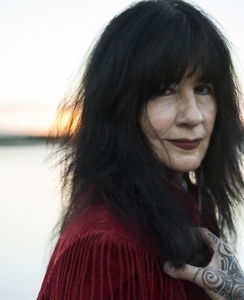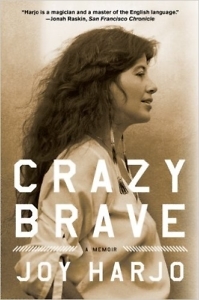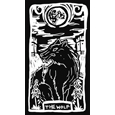Clear-Eyed Mystic
Joy Harjo’s poems celebrate transcendence and confront fear
In Joy Harjo’s 2015 poetry collection, Conflict Resolution for Holy Beings, there’s a poem called “Rabbit Is Up to Tricks” about the origin of human folly. “Rabbit” molds and breathes life into the first man and sets loose terrible destruction by teaching him to steal. “The wanting infected the earth,” Harjo writes, and when Rabbit tries to intervene, he discovers that his creation is as heedless as he is greedy: “Rabbit realized he’d made a clay man with no ears.” The poem is spiritual, funny, clever, clear-eyed, and heartbreakingly sad. It declines to console by softening its picture of rapacious humanity, and in this way it is typical Harjo. Her work celebrates beauty and transcendence, but it’s uncompromising about pain.
 Harjo—who joined the faculty at the University of Tennessee in Knoxville this year and who holds the Chair of Excellence in Creative Writing there—was born in Tulsa, Oklahoma, in 1951. She is a member of the Muscogee (Creek) Nation. (Harjo herself uses the autonym Mvskoke.) She became a mother while still in her teens and has described herself as a young woman “in terrible need of flight.” After college at the University of New Mexico, Harjo went on to earn an M.F.A. from the Iowa Writers’ Workshop. In We Wanted to Be Writers, a collection of interviews with IWW grads, she says she found the workshop culture “foreign” and “struggled with a chasm of loneliness” during her time there, but she emerged solidly on the path to a long and acclaimed career as a poet.
Harjo—who joined the faculty at the University of Tennessee in Knoxville this year and who holds the Chair of Excellence in Creative Writing there—was born in Tulsa, Oklahoma, in 1951. She is a member of the Muscogee (Creek) Nation. (Harjo herself uses the autonym Mvskoke.) She became a mother while still in her teens and has described herself as a young woman “in terrible need of flight.” After college at the University of New Mexico, Harjo went on to earn an M.F.A. from the Iowa Writers’ Workshop. In We Wanted to Be Writers, a collection of interviews with IWW grads, she says she found the workshop culture “foreign” and “struggled with a chasm of loneliness” during her time there, but she emerged solidly on the path to a long and acclaimed career as a poet.
Her first full-length collection, What Moon Drove Me to This? was published in 1980 and has been followed by eight more collections, as well as a two books for children and a well-received 2012 memoir, Crazy Brave. Writing in The Los Angeles Review of Books, Jack Shakely describes Crazy Brave as “the key that unlocks many of the coded poems” in Harjo’s oeuvre, and he praises the book as “raw and honest.” Harjo herself has described it as “the story I didn’t want to write.” She spent fourteen years working on the slim volume.
 Critics often place Harjo in the company of other Native American writers who rose to prominence in the 1970s and 1980s—the so-called “Native American renaissance” that includes Louise Erdrich, Leslie Marmon Silko, and James Welch. Harjo’s work is rich in imagery associated with Native American culture, and it’s deeply grounded in her own experience as the Other in a white-dominated society. In her 1990 collection, In Mad Love and War, she writes: “Even at two I knew we were different. Could see through the eyes of strangers that we were trespassers in the promised land. The Sooner State glorified the thief. Everyone and no one was Indian. You’d best forget, claim a white star.”
Critics often place Harjo in the company of other Native American writers who rose to prominence in the 1970s and 1980s—the so-called “Native American renaissance” that includes Louise Erdrich, Leslie Marmon Silko, and James Welch. Harjo’s work is rich in imagery associated with Native American culture, and it’s deeply grounded in her own experience as the Other in a white-dominated society. In her 1990 collection, In Mad Love and War, she writes: “Even at two I knew we were different. Could see through the eyes of strangers that we were trespassers in the promised land. The Sooner State glorified the thief. Everyone and no one was Indian. You’d best forget, claim a white star.”
That early, powerful sense of injustice drives some of her most popular poems, including “I Give You Back,” which is addressed to her own haunting fear:
You are not my blood anymore.
I give you back to the soldiers
who burned down my home, beheaded my children,
raped and sodomized my brothers and sisters.
I give you back to those who stole the
food from our plates when we were starving.
I release you, fear, because you hold
these scenes in front of me and I was born
with eyes that can never close.
A musical sensibility is at the center of Harjo’s aesthetic, and she is an accomplished singer and saxophone player. She’s released five CDs of original music and won Female Artist of the Year in the 2009 Native American Music Awards. There’s no bright line between her poetry and her music—they flow into each other to create entertaining performance pieces. (She delivers “Rabbit Is Up to Tricks” with musical accompaniment here.) But even without music, she has a powerful stage presence and is a master at bringing a poem to life, as in this performance of “I Give You Back.”
Harjo’s list of awards and honors is long and includes the William Carlos Williams Award from the Poetry Society of America, a Lifetime Achievement Award from the Native Writers Circle of the Americas, the Wallace Stevens Award from the Academy of American Poets, and a 2013 American Book Award for Crazy Brave.

Maria Browning is a fifth-generation Tennessean who grew up in Erin and Nashville. A graduate of Mount Holyoke College, she has attended the Clothesline School of Writing in Chicago, the Moss Workshop with Richard Bausch at the University of Memphis, and the Sewanee Writers’ Conference. She lives in White Bluff.


